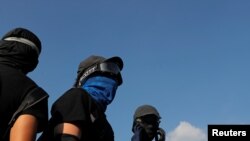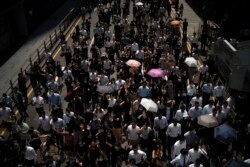Hong Kong is considering an emergency measure that would include a ban on face masks in an attempt to quell the violent anti-Beijing protests that have rocked the financial hub since June.
Local news outlets say embattled chief executive Carrie Lam will announce the ban Friday after a meeting with the city's Executive Council. Many of the protesters have worn the masks to conceal their identities. The face mask ban would be included in an emergency law that would include a curfew and other measures.
The proposed emergency law is an apparent response to Tuesday's violent clashes between pro-democracy demonstrators and Hong Kong security forces, which overshadowed Beijing's carefully choreographed celebration marking the 70th anniversary of Communist Party rule in China. Riot police fired tear gas and water cannon at umbrella-carrying protesters, who hurled homemade gasoline bombs at them and set several fires throughout the main section of the city.
During Tuesday's unrest, an 18-year-old student protester was shot at close range in the chest by a policeman as the student was about to strike the officer with a metal rod. The shooting marked the first time Hong Kong police have used live rounds since the demonstrations began.
Police say the shooting was justified because the officer feared for his life. The student, identified as Tsang Chi-kin, is in stable condition at a Hong Kong hospital. He was charged Thursday with rioting, which carries a maximum prison sentence of 10 years.
Hundreds of demonstrators again clashed with police late Wednesday night in a repeat of Tuesday's protests.
The protests, which were sparked by a proposed bill that would have allowed criminal suspects to be extradited to mainland China, mark a direct challenge to Beijing's tightening grip on the autonomous city.
Although Lam later withdrew the bill, the protests have since evolved into renewed demands for Hong Kongers to choose their own leaders, ending the current system where business elites with ties to Beijing select nearly half the legislative body.
The demonstrators are also demanding an independent inquiry into possible use of excessive force by police and complete amnesty for all activists arrested.
In his National Day speech Tuesday, President Xi Jinping reaffirmed both Hong Kong and Macau's one country, two systems autonomy, but emphasized that his government will continue to fight to reunify the entire Chinese population, which includes the autonomously ruled island of Taiwan.







